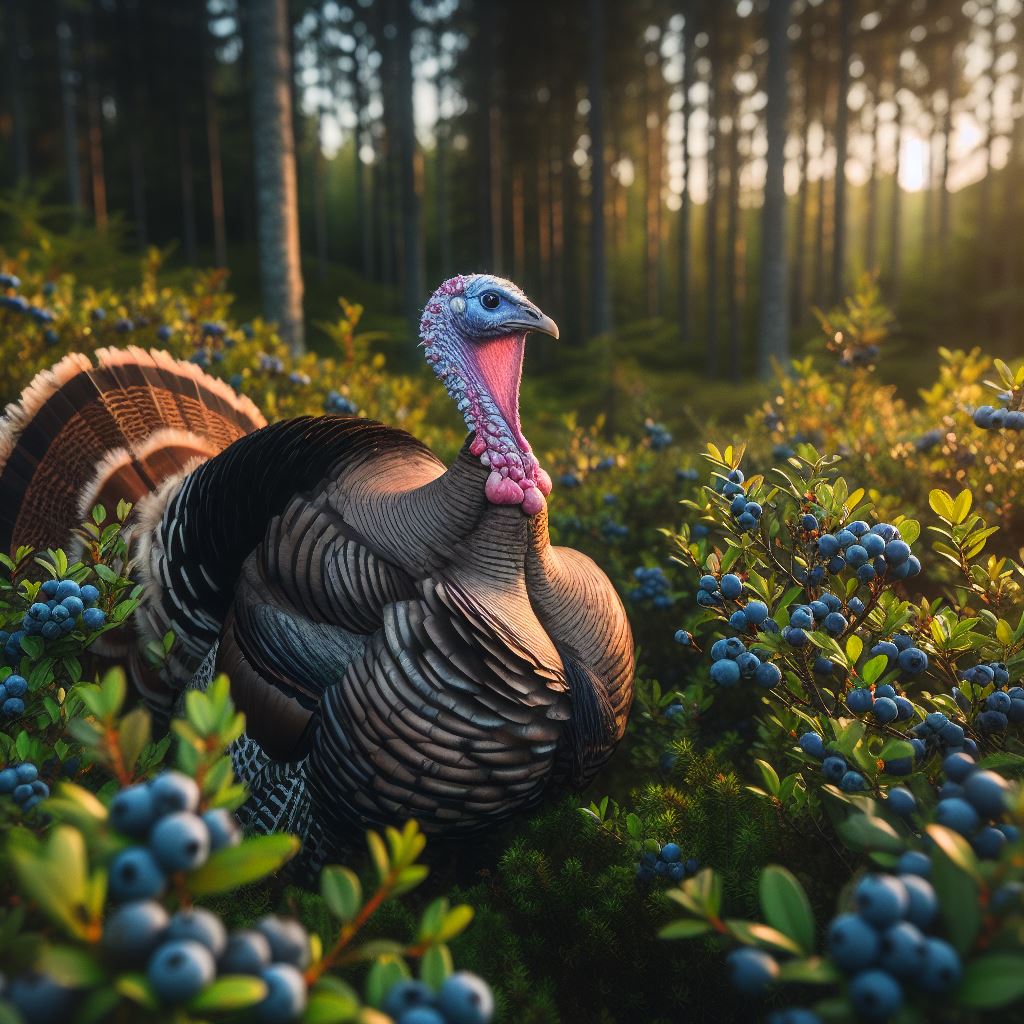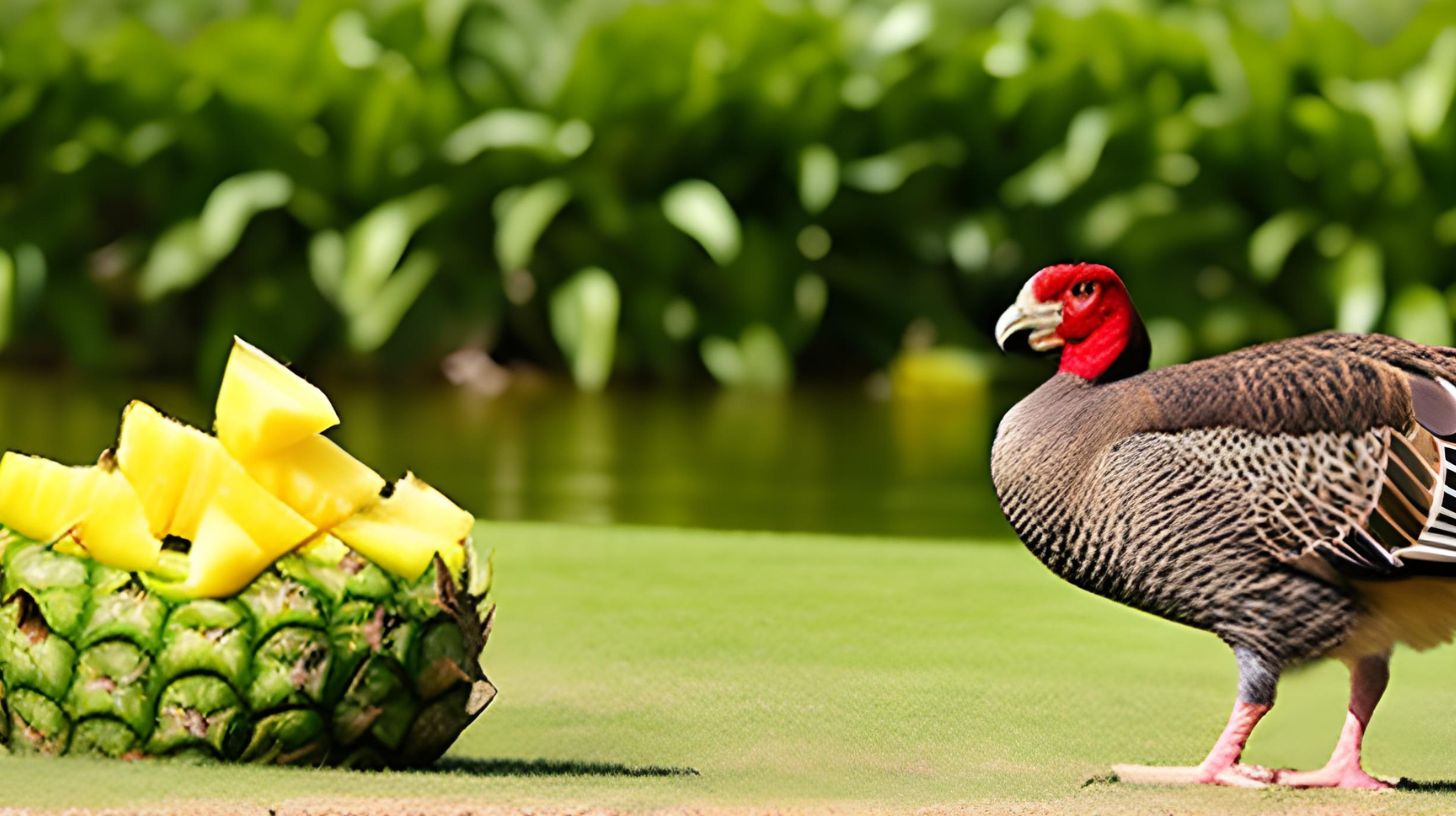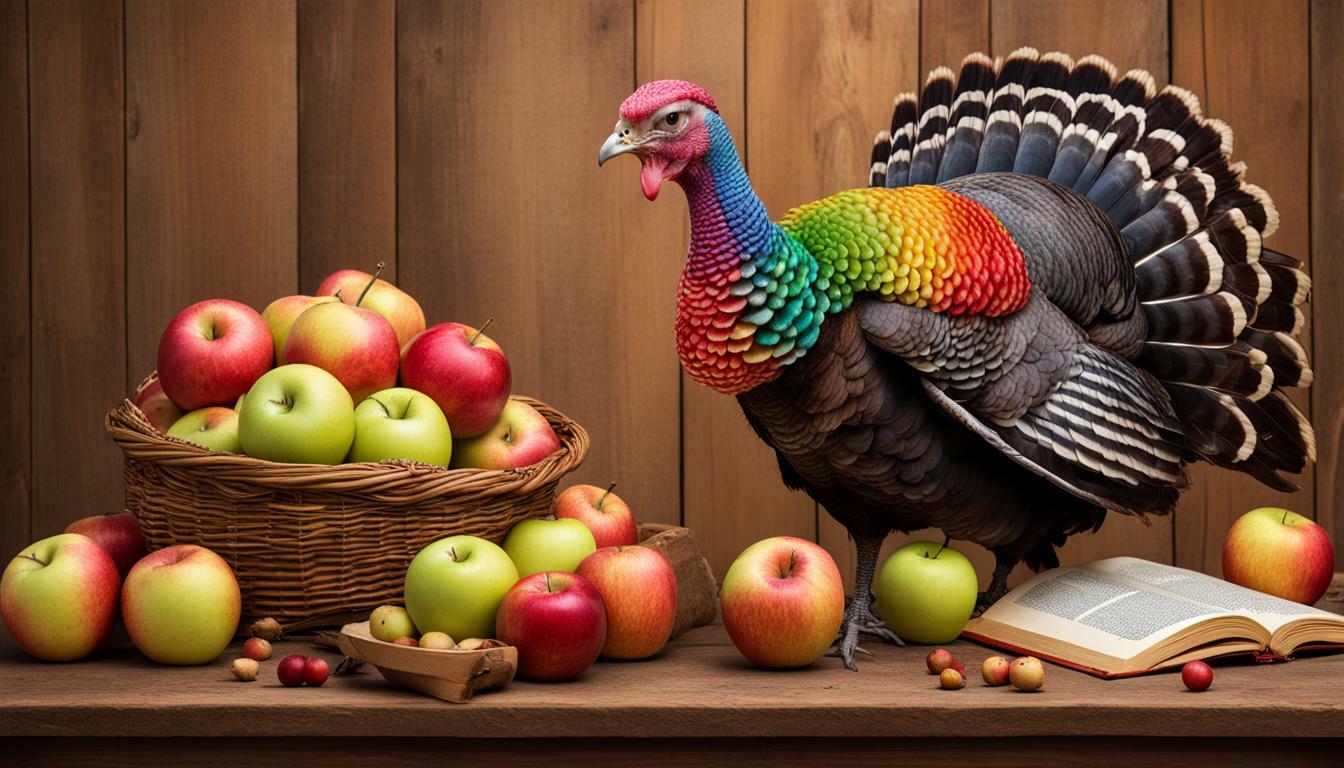Can Turkeys Eat Corn?
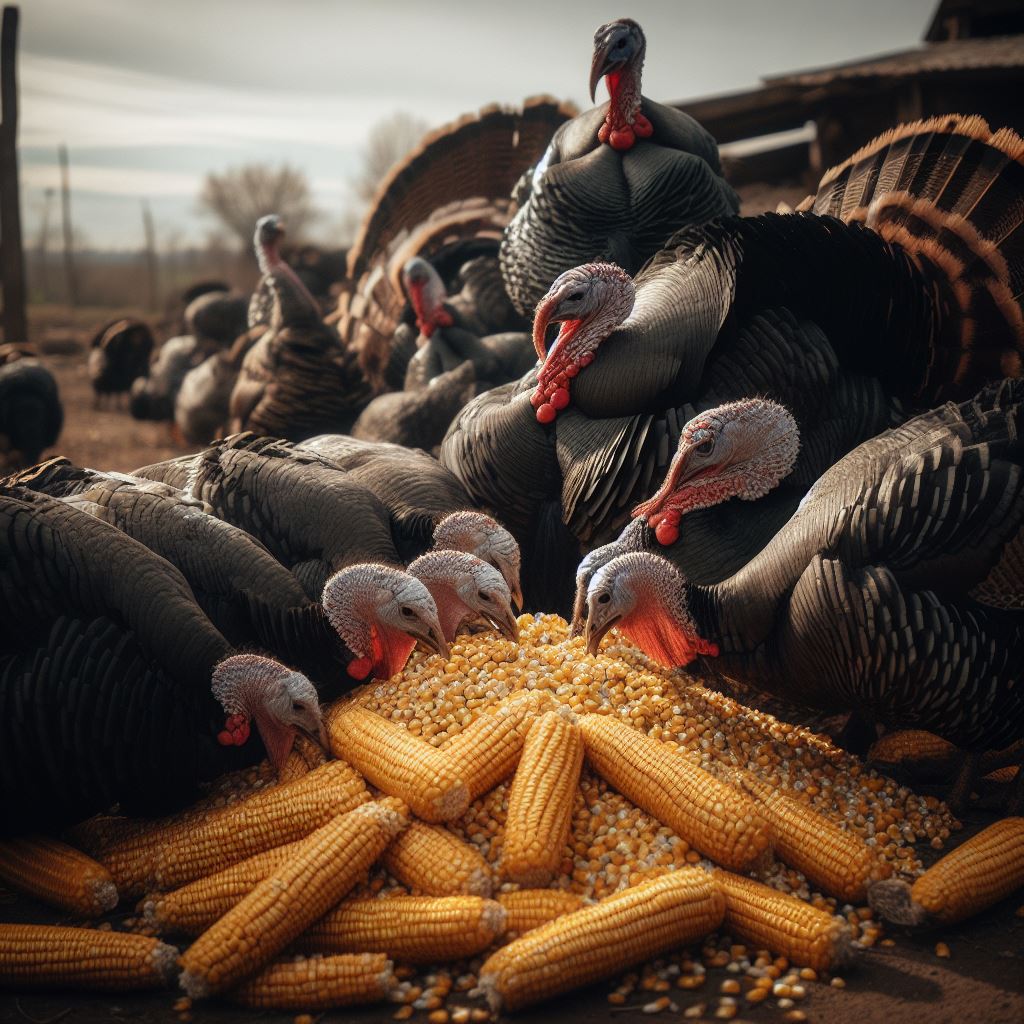
Table of content:
Corn can be an enjoyable occasional treat for turkeys but it’s important to understand how to feed it safely as part of a balanced diet. This comprehensive guide provides turkey owners with practical advice on feeding corn to turkeys.
As a turkey owner, you want to provide your birds with optimal nutrition to support their health. And what bird doesn’t enjoy a tasty snack every now and then? Corn is a common treat for backyard turkeys, but there are some important considerations.
Corn is a cereal grain and perfectly fine for turkeys to consume. However, turkeys have delicate digestive systems, so any treats should be fed in moderation. An occasional handful of corn can add variety to their diet without disrupting their nutritional needs. However, overdoing high-carb foods like corn risks digestive upset and obesity.
The key is balance. By understanding proper corn feeding guidelines, you can safely incorporate this desirable snack into your turkey’s routine. This article covers everything turkey owners need to know, including:
- The nutritional value of corn for turkeys
- Recommended feeding guidelines and portion sizes
- Benefits and risks of feeding corn
- Safely introducing and transitioning to corn
- Best practices for preparing and serving corn treats
- Signs of overfeeding and what to do
Follow these tips to give your turkeys an extra bit of enjoyment while supporting their health.
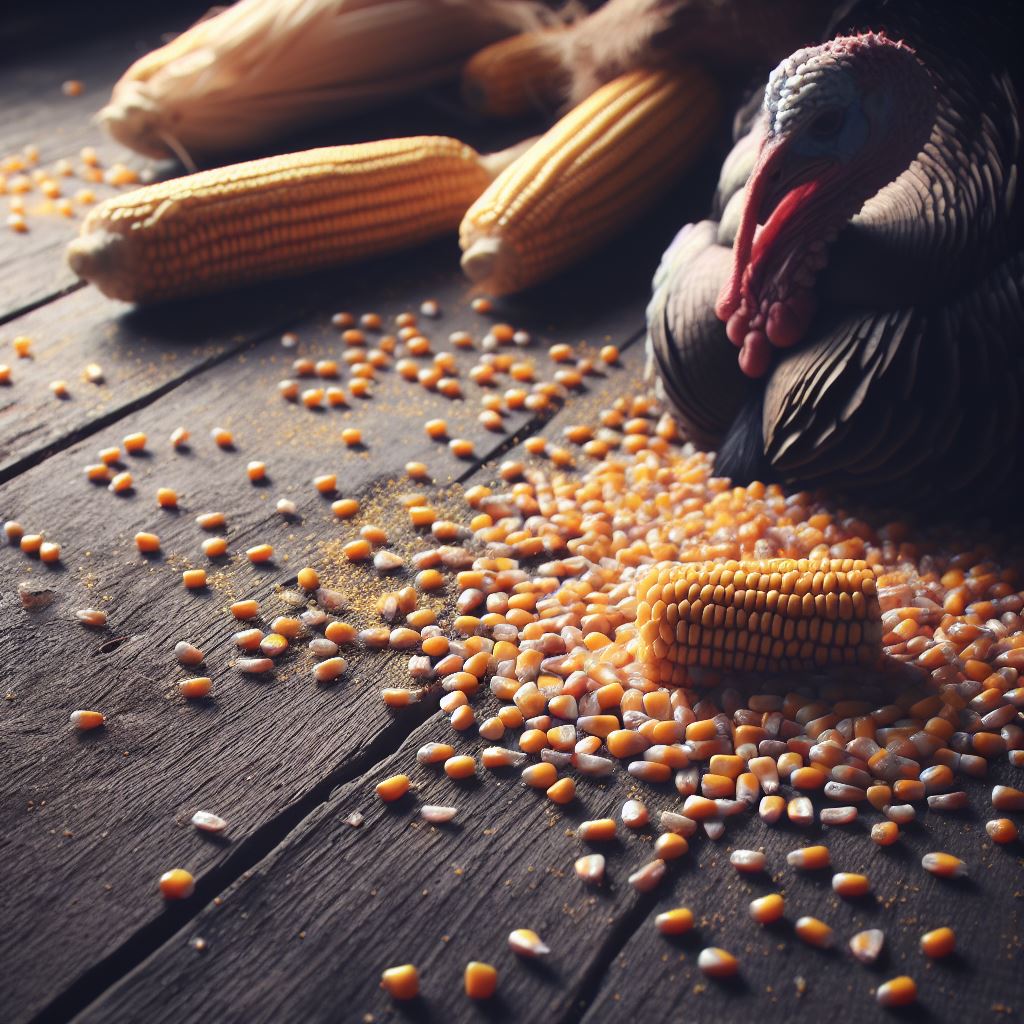 The Nutritional Value of Corn for Turkeys
The Nutritional Value of Corn for Turkeys
Corn is a starchy vegetable that is relatively low in protein. Here is the nutritional breakdown per 100 grams of yellow corn:
- Calories: 365
- Carbs: 74 g
- Protein: 9.4 g
- Fat: 4.74 g
- Vitamin A: 11% DV
- Vitamin C: 6% DV
So while corn provides some nutrients, it is very high in carbohydrates compared to the protein turkeys need.
Turkeys require at least 24% protein in their overall diet. An adult turkey needs around 30 grams of protein daily. Corn alone does not meet their nutritional requirements.
Think of corn as more of a treat than a dietary staple. It should not make up more than 10% of their total food intake.
Recommended Feeding Guidelines
When feeding corn to turkeys, follow these guidelines:
- Introduce corn slowly and in small amounts to allow their digestive system to adjust
- Limit corn to no more than 1-2 times per week
- Feed corn as a snack, not a meal replacement
- Only feed 1-2 tablespoons of corn per turkey at a time
- Provide plenty of fresh water to help digestion
- Monitor turkeys for signs of digestive upset or decreased appetite
- Discontinue corn if adverse reactions occur
Moderation is key. Too much corn could lead to weight gain and nutritional deficiencies in turkeys over time. Consider corn an occasional treat, not a dietary staple.
For Young Poults
Baby turkeys under 4 months old have a less developed digestive tract. Hold off on feeding corn until poults are fully feathered and at least 16 weeks old. Their diet should consist mainly of turkey starter feed.
For Adult Turkeys
Adult turkeys over one year can better tolerate small portions of corn as a supplemental snack. But their main diet should still be complete turkey feed.
Limit corn to no more than one or two individual tablespoons per adult turkey a couple times a week. Gradually introduce corn by starting with just a few kernels at first.
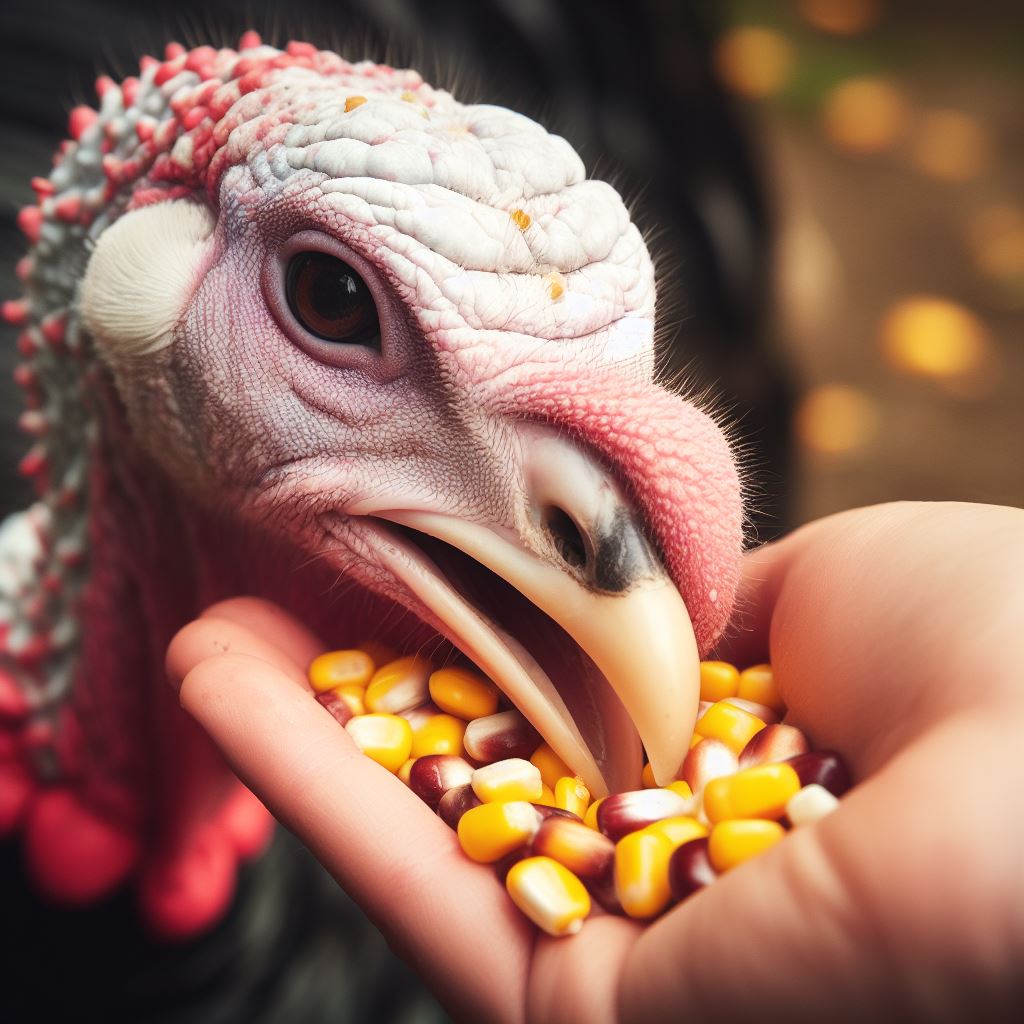 Benefits of Feeding Corn to Turkeys
Benefits of Feeding Corn to Turkeys
When included as a rare treat, corn offers a few benefits:
- Added calories – The extra calories from corn can help turkeys maintain body weight and provide energy. This is especially useful in winter.
- More variety – Turkeys enjoy the taste of sweet corn as a change of pace from their regular turkey feed. A handful of corn makes a fun snack.
- Supports digestion – The fiber in corn can support good digestion and gut health. Soluble fiber from corn may also contribute to heart health.
Feeding the occasional corn snack gives turkeys something to look forward to. Just be mindful of portion sizes. Too much corn can cause more harm than good.
Risks and Precautions for Feeding Corn
While corn is not toxic to turkeys, overfeeding it does come with some risks:
- Weight gain – The high carbohydrate content coupled with low protein can lead to obesity over time, which strains the cardiovascular system.
- Nutritional deficiencies – Relying too heavily on corn could lead to deficiencies in important nutrients like protein, vitamins, and minerals.
- Digestive upset – Eating too much corn could cause discomfort, diarrhea, intestinal issues due to the high starch content. Signs of digestive upset might include changes in droppings, lethargy, or loss of appetite.
- Impacted crop – Eating corn too quickly without adequate water can cause kernel hulls to get lodged in the crop. This can prevent a turkey from digesting any food.
- Aflatoxin poisoning – Corn contaminated with aflatoxin mold can be toxic. Ensure corn is fresh and mold-free. Discard any damp, discolored kernels.
To avoid these risks, feed corn in strict moderation. Always mix corn with the turkey’s regular feed and provide plenty of fresh, clean water. Monitor your turkeys for any concerning symptoms and discontinue corn if problems arise.
Safely Introducing and Transitioning to Corn
When first offering corn to turkeys, take it slow:
- Gradually introduce just a few kernels at a time mixed in with their regular food.
- Slowly increase corn quantity over a period of 2-3 weeks, monitoring for reactions.
- Feed corn separate from normal feed at first to gauge interest and consumption.
- Mix increasing amounts of corn into the feed until the desired snack portion is tolerated.
- If introducing corn to multiple turkeys, provide one small handful per bird so dominant turkeys don’t over-consume.
- Ensure all turkeys have equal access to fresh water to support digestion.
- Watch for changes in appetite, energy levels, droppings and any signs of upset stomach.
- Reduce or eliminate corn if any intolerance is observed.
With patience, you can transition turkeys to enjoy corn as an occasional treat without digestive upset. Introduce corn slowly and keep an eye on how each turkey reacts.
Best Practices for Feeding Corn
Follow these tips for safely feeding corn:
- Select fresh, ripe corn. Avoid old, dried, or moldy corn.
- Cook plain corn instead of adding sugar, salt, or butter. Roasting or boiling are healthiest.
- Allow corn to cool completely before feeding it to turkeys to prevent crop burns.
- Remove tough corn hulls which could cause choking or cropping issues.
- Mix small pieces of cooked corn into their feed for easier digestion rather than feeding kernels.
- Prevent gorging by limiting corn to individual portions distributed evenly.
- Ensure turkeys have unlimited access to fresh, clean water to help digest corn.
- Supervise turkeys during snack time to ensure proper consumption.
- Introduce corn slowly and incrementally increase quantity week-by-week if well tolerated.
Following these best practices will help make corn a fun, safe supplemental snack.
Signs of Overfeeding and What to Do
Be alert for these signs of possible corn overfeeding:
- Increased body weight or obesity
- Lethargy, weakness, or decreased activity
- Changes in droppings – loose stool, diarrhea, abnormal coloration
- Loss of appetite or disinterest in regular feed
- Visible crop swelling or impaction
- Signs of respiratory distress
- Increased water intake
If you observe any of these symptoms, immediately stop feeding corn. Allow the digestive system to rest by providing only regular turkey feed. Make sure turkeys have unlimited access to fresh water to help flush their system. Monitor them closely and contact a veterinarian if symptoms do not resolve.
To avoid overfeeding in the future, decrease corn portion sizes and frequency. Do not resume corn treats until turkeys exhibit normal appetite, energy and droppings. Slowly reintroduce corn in smaller amounts. Discontinue use if any intolerance reoccurs.
Conclusion
While most turkeys love eating corn, it should only be an occasional treat. When fed safely and in moderation, corn can add variety to a turkey’s diet without disrupting nutritional needs.
By following proper feeding guidelines, monitoring intake, and introducing corn slowly, turkey owners can give their birds this special snack without adverse effects. A handful of corn here and there can bring your turkeys joy while maintaining a healthy, balanced diet.
Just be sure to keep treats limited and watch for any signs of digestive upset. With a thoughtful approach, corn can be a fun way to show your turkeys some extra love.
Welcome. I’m Adreena Shanum, the proud owner of this website, and I am incredibly passionate about animals, especially poultry. I founded adreenapets.com as a labor of love, stemming from my desire to share my knowledge and experiences with poultry enthusiasts worldwide.

